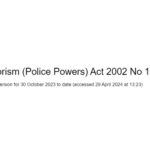Police Powers in NSW: A Summary of Criminal Offences in the LEPRA

By Vikas Puthiyedath
The Law Enforcement (Powers and Responsibilities) Act 2002, commonly known as ‘the LEPRA’, sets out many of the powers and responsibilities that apply to police in New South Wales.
Scope of the LEPRA
These rules relate to a range of law enforcement actions, including:
- Entering premises without a warrant,
- Requiring identity of members of the public,
- Search and seizure,
- Arrests without a warrant,
- Search warrants,
- Production of documents,
- Digital evidence access orders,
- Emergency orders such as public safety orders,
- Crimes scenes,
- Investigations and questioning,
- Drug detection dogs (also known as ‘sniffer dogs’), and
- Move on orders.
Criminal Offences under the LEPRA
The LEPRA also prescribes a range of criminal offences that apply to those who refuse or otherwise fail to comply with the directions of police officers who are enforcing those powers.
Here’s a summary of those offences.
Failure to Disclose Identity to a Police officer
Failure to disclose identity to a police officer is a significant offence under LEPRA.
Section 11 of the Act stipulates that any person who fails to disclose their identity to a police officer if their identity is not already known to the officer or refused to comply with the requirement is committing an offence.
The penalties include a maximum penalty of a fine equivalent to two penalty units.
This provision ensures that police officers can carry out their duties without undue interference, thus maintaining law and order.
Providing False or Misleading Identity Information to a Police Officer
Providing false or misleading identity information to a police officer is another serious offence under LEPRA.
Section 13 states that any person who provides false or misleading identity to a police officer is committing an offence to a police officer while they are executing their duties.
The penalty carries a maximum penalty of a fine equivalent to two penalty units.
This provision is vital for safeguarding police officers from harm and ensuring they can perform their duties without fear of violence.
Obstructing or Hindering the Execution of Search Warrant
Obstructing or hindering the execution of a search warrant is also covered under LEPRA.
This offence includes any act that obstructs or impedes a police officer in the conduct of a search warrant.
Section 52 of the Act makes it clear that such behaviour is unacceptable and subject to legal penalties that carries a maximum penalty of 2 years in prison.
This provision ensures that police investigations can proceed smoothly and without unnecessary delays.
Failing to Comply with a Direction
Under section 199 of LEPRA, police officers have the power to issue move-on orders to individuals or groups to prevent disorder, protect public safety, or stop crime if they refused or failed to comply with a direction.
Failing to comply with a direction is an offence and can result in a maximum penalty of a fine equivalent to 2 penalty units.
This power is ostensibly for managing public spaces and preventing disturbances, but the potential for misuse is obvious.
Specific Police Powers
LEPRA grants police officers a range of specific powers to enforce the law and maintain public order.
These powers include the authority to stop, search, and detain individuals; conduct searches of premises; seize property; and use reasonable force when necessary.
Each of these powers is subject to specific conditions and limitations to prevent abuse and protect individual rights.
Power to Removal or Modifications of Fortifications
One of the critical powers under LEPRA is the authority to remove or modify fortifications.
Sections 210D outlines the circumstances under which police can apply for a fortification removal order under the provisions of Part 4 of the Local Court Act 2007.
These include situations where the officer suspects on reasonable grounds that the person or persons is preventing or impeding police access to the premises.
Power to Arrest
The power to arrest without a warrant is another essential aspect of LEPRA. Section 99 details the conditions under which a police officer can arrest a person without a warrant, such as when the officer believes on reasonable grounds that the person has committed or is about to commit an offence.
Arrests must be made for legitimate reasons, such as preventing the continuation or repetition of an offence, ensuring the appearance of the person in court, or protecting the safety of the community or individuals.
Search and Seizure of Property
LEPRA also provides police with the authority to search premises and seize property.
Section 47 allows police to enter and search premises with a search warrant issued by a judicial officer.
However, there are circumstances under which police can enter and search premises without a warrant, such as in emergencies or when chasing a suspect.
The Act outlines strict procedures to ensure that searches are conducted lawfully and that seized property is handled appropriately.
Use of Force
The use of force by police officers is a sensitive and critical aspect of LEPRA.
Section 230 permits police to use reasonable force when exercising their duties, including making arrests or conducting searches.
The level of force used must be proportionate to the situation and necessary to achieve a legitimate law enforcement objective.
Excessive use of force is prohibited and can lead to disciplinary action or criminal charges against the officer.
Move-On Powers
Section 197 gives police the authority to issue move-on orders to individuals or groups to prevent disorder or crime and protect public safety.
This power allows police to manage crowds and prevent situations from escalating into violence.
Move-on orders must be reasonable and based on specific criteria outlined in the Act.
Failure to comply with a move-on order is an offence and can result in penalties.
Power with little accountability
While the LEPRA grants significant powers to police officers, it also includes provisions that are meant to protect individual rights and ensure accountability.
The Act requires police to inform individuals of their rights during interactions, such as the right to remain silent and to legal representation.
Additionally, the LEPRA mandates that police actions are subject to oversight and review, providing mechanisms for complaints and investigations into misconduct – although securing accountability can be difficult when the police oversight body, the Law Enforcement Conduct Commission, or LECC, is under-resourced and unable to discipline let alone bring criminal charges against police officers who engage in misconduct.
By codifying police powers, LEPRA is meant to make police actions lawful, proportionate, and police officers themselves accountable, although this is certainly not always the case.






